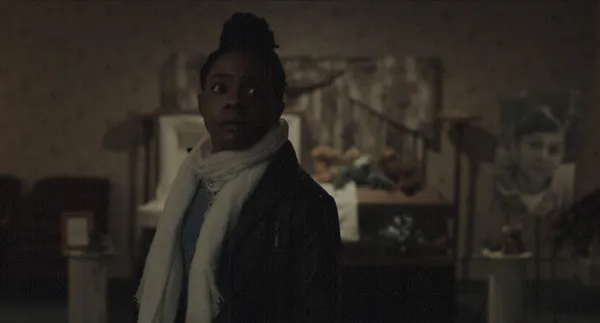Eye For Film >> Movies >> The Harbinger (2022) Film Review
The Harbinger
Reviewed by: Jennie Kermode

When Covid-19 first became a pandemic, New York City was one of the places hit hardest. To date, over 40,000 people have died there from the disease, most of them in those first few weeks in early 2020. Despite efforts by assorted politicians to claim that it’s all over now, there has been very little effort to reckon with his, or with the mass bereavement which has occurred elsewhere in the world. The big push to get society back to normal has made it very difficult for individuals and families to process grief, and for society more widely to adjust to the sudden absence of a lot of people. Any psychologist will tell you that this is dangerous. We need to deal with the trauma which the pandemic has caused. This is something which horror cinema can be very good at, and The Harbinger is an early effort to fill that gap.
Directed by Andy Mitton, himself a New Yorker, the film follows Monique (Gabby Beans), who is persuaded to venture out from the lockdown bubble she has created with her father and brother when she hears that her friend Mavis (Emily Davis) urgently needs support. Although she seems confident and well adjusted now, Monique was suicidal at one point in the past, and Mavis helped her then, so she feels that this is the least she can do – despite the fact that Mavis lives in Queens, which is ground zero for Covid. Getting there, she passes a mother who is struggling to open the door of the building with a coughing child in her arms, and the crisp sound design reminds us how frightening it was to hear a cough in those early, pre-vaccine days. It subsequently turns out that the child lives upstairs from Mavis and they can hear his coughing through the ceiling, a potent reminder of their own mortality.
Mavis’ problem, as we have learned in a prologue, is that she is suffering from severe nightmares as well as sleepwalking. She is, it seems, sleeping for far longer at a time than is natural, and she fears that there will come a point when she just won’t wake up. Here Mitton reminds us about the many people who suffered physical and mental health crises during that period – sometimes with fatal consequences – because hospitals were too overwhelmed by Covid cases to help them. Given her rattled nerves and general exhaustion, Mavis is holding herself together pretty well, doing her best to remain rational, and Monique figures that all she will need to do is stay close to her at night, waking her if necessary, so that she can get back to normal. What she doesn’t count on is beginning to have similar dreams herself.
Looming large in these dreams is a tall, black-robed figure in a plague doctor mask, a demon symbolic of contagion itself. “What this thing is, at its core, is a bad idea,” says a therapist they speak to online, who urges them not so share a picture of it or talk about it elsewhere. What she is doing is drawing a parallel between viral and memetic contagion, illness and what might be understood as paranoia, but, in this case, with a genuine dangerous force behind it. Once certain thoughts are stuck in the brain, it might be impossible to make them disappear. Indeed. one might disappear oneself, not only dying but (like so many Covid victims who had nobody to mourn them and were buried in mass graves) forgotten, erased, as if one had never been born.
Making this still darker is the suggestion that, back in her suicidal days, this kind of erasure was something which Monique actually wanted. She certainly doesn’t now – but can she and Mavis escape? Mitton weaves an additional layer of narrative around the little hints of people who have already disappeared, curious traces something like the impression made by ghosts, and in so doing touches on that overwhelming social experience of loss, that awareness that we are not aware of everyone who has vanished from our lives.
if you have been affected by Covid deaths, however indirectly, the chances are that you will find parts of this film difficult to watch. It also presses a lot of buttons for people with other forms of trauma. Needless to say, this only underlines its importance. Mitton takes it slowly, using beautiful images of a winter landscape to soothe and beguile. There are no lurid monster movie theatrics, just a creeping sense of dread. In the day to day, silence emphasises the sense of isolation. In dreams, the ambient soundscape sometimes feels overwhelming, placing us abruptly back in a world where everything is immediate. Over time, however, it becomes harder to tell the two states apart. The edges of reality seem to blur, as they did for many people in isolation during lockdown.
Skilfully crafted, The Harbinger is a rightly distressing, melancholy take on the events of the recent past and the troubles we still live with today. It screened at the 2022 Fantasia International Film Festival in Montreal, where around 12,000 people have died from Covid to date. One hopes that it will mark the start, not the end, of a conversation about how we deal with real world horrors. All this aside, as a piece of fictional horror, it will send a real shiver down your spine.
Reviewed on: 21 Jul 2022

















